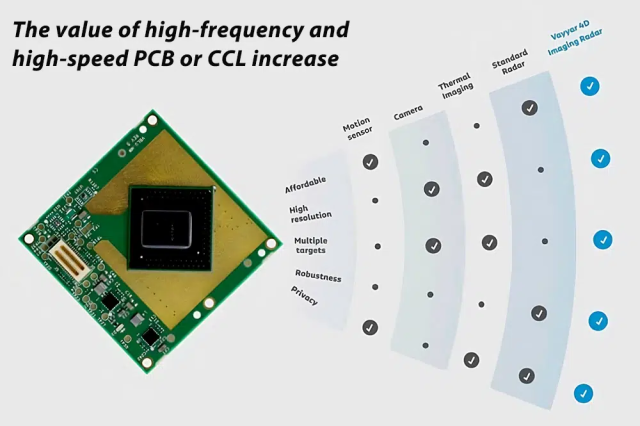1. Engineering Overview
Automotive mmWave radar modules for advanced driver-assistance systems (ADAS) require precise RF signal propagation with minimal loss and stable impedance across multilayer PCBs. Trace density and high-frequency operation introduce challenges in maintaining signal integrity and crosstalk suppression. Megtron 7 PCBs, with Dk = 3.40 ±0.02 and Df = 0.0018 @ 10 GHz, provide low insertion loss, superior dielectric uniformity, and excellent thermal stability.
KKPCB combines material science with stackup optimization and RF simulation to deliver predictable transmission characteristics, ensuring accurate beamforming and radar detection even under automotive thermal and mechanical stresses.

2. Engineering Context & Technical Challenges
In automotive radar front-end boards using Megtron 7 PCB materials, impedance drift, dielectric fluctuation, and inter-layer coupling can degrade signal fidelity. High-speed TX/RX traces in compact layouts risk increased insertion loss and near-end crosstalk. Maintaining phase alignment and low reflection is critical for mmWave radar resolution.
| Challenge | Root Cause | Engineering Impact |
|---|---|---|
| Impedance variation | Dielectric inconsistency in lamination | Signal reflection and timing errors |
| Insertion loss | Copper roughness and high-frequency skin effect | Reduced radar sensitivity |
| Crosstalk | Dense differential pair routing | False target detection and SNR reduction |
| Thermal stress | CTE mismatch | Impedance drift and potential delamination |
3. Material Science and Performance Characteristics
Megtron 7 offers advantages over traditional FR-4 or PTFE laminates in RF-critical automotive applications:
| Property | Megtron 7 | FR-4 | Engineering Impact |
|---|---|---|---|
| Dk @10 GHz | 3.40 ±0.02 | 4.20 ±0.05 | Consistent impedance control |
| Df @10 GHz | 0.0018 | 0.018 | ~90% lower signal loss |
| Tg | 210°C | 135°C | Thermal reliability under engine heat |
| CTE Z-axis | 42 ppm/°C | 70 ppm/°C | Reduced warpage |
| Thermal Conductivity | 0.45 W/m·K | 0.3 W/m·K | Enhanced heat dissipation |
These properties support low-loss, phase-coherent RF transmission required in automotive mmWave radar systems.

4. KKPCB Engineering Case Study
Client & Application Context:
A major automotive OEM requested high-frequency radar modules with low insertion loss and tight impedance control for a 77 GHz ADAS mmWave radar PCB.
Engineering Problem:
Prior designs exhibited 0.28–0.35 dB/in insertion loss and impedance deviations up to ±10%, causing phase misalignment and beamforming inaccuracies.
KKPCB Solution:
1️⃣ Selected Megtron 7 PCB substrates for low Df and stable Dk.
2️⃣ Applied hybrid lamination with controlled resin flow to maintain dielectric uniformity.
3️⃣ Optimized differential pair routing, ground plane placement, and via stub lengths.
4️⃣ Verified impedance and insertion loss via HFSS and TDR across the frequency band.
Measured Result:
| Parameter | Target | KKPCB Result |
|---|---|---|
| Insertion Loss (77 GHz) | ≤0.25 dB/in | 0.22 dB/in |
| Impedance Variation | ±10% | ±3% |
| Crosstalk Isolation | ≥−35 dB | −38 dB |
| Phase Deviation | ≤1° | 0.7° |
Resulting PCBs delivered accurate radar beamforming with low reflection and high SNR.
5. Stackup Design & RF Implementation
KKPCB implemented a 6-layer hybrid Megtron 7 stackup with controlled copper roughness (Ra <1 µm) and carefully placed ground planes. Microvia backdrilling minimized stubs and reflections. HFSS simulations and TDR measurements confirmed stable impedance, low insertion loss, and minimal crosstalk across all critical traces.
6. Reliability & Environmental Validation
| Test Type | Condition | Result |
|---|---|---|
| Thermal Cycling | −40°C to +150°C, 1000 cycles | Pass, no delamination, impedance stable |
| Humidity | 85°C / 85% RH, 1000 h | Pass, minimal Df variation |
| Vibration & Shock | Automotive standards | Pass, no cracking or via failure |
| Solder Float | 288°C, 10 sec | Pass, stable adhesion |
These tests confirm long-term performance and mechanical reliability under real-world automotive conditions.
7. Conclusion — Engineering Reliability Integration
Megtron 7 PCBs provide low-loss transmission, stable impedance, and crosstalk control for automotive mmWave radar systems. KKPCB’s controlled lamination, hybrid stackup design, and RF validation ensure high-frequency signal integrity, phase stability, and long-term operational reliability. This combination of material performance and engineering precision supports accurate radar sensing and ADAS functionality.
8. Contact / CTA
Contact KKPCB Engineering Team for customized multilayer stackup design, impedance verification, and reliability validation using Megtron 7 PCBs for automotive radar, 5G, industrial IoT, and aerospace RF modules.

